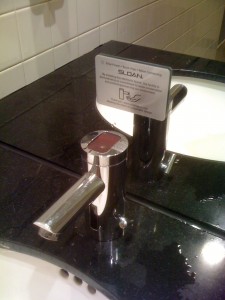 I saw this faucet in a local mall in Vancouver, and it took me a moment to realize it wasn’t a joke. Your eyes aren’t deceiving you: What you’re seeing is a solar-powered electronic faucet, complete with a handy informative plaque:
I saw this faucet in a local mall in Vancouver, and it took me a moment to realize it wasn’t a joke. Your eyes aren’t deceiving you: What you’re seeing is a solar-powered electronic faucet, complete with a handy informative plaque:
By installing this electronic faucet, this facility is demonstrating its commitment to water conservation and protecting/preserving our environment.
The mind boggles. Apparently, conserving water requires electricity and someone figured that adding a solar panel to the device would turn the conservation-cred of this faucet up to eleven.
It’s almost comical. For one thing, a solar-powered faucet can’t be solar-powered when it’s indoors – solar implies the light source is the sun, but in this case the light source is the fluorescent lights.
But really, focusing on the idiocy of an indoor solar-powered faucet overlooks the biggest problem: a faucet that requires electricity to run in the first place. The primary touted benefit of an electronic faucet is its ability to conserve water – something which was already achievable with spring-powered faucets. So, if it was already achievable without electricity, what’s the point of this thing?
The answer lies in the secondary benefit: touch-less operation. While I doubt there’s a high risk of contamination from a faucet in a bathroom, I suppose there can be a case made that it reduces costs to keep the faucet clean. There is, however, an alternative solution: a pedal-based faucet. We saw these in France, and I thought they were brilliant: no power, water-conserving, touch-less operation (I don’t think the bottom of your shoes are at any increased risk of contamination).
It the greenwashing by companies like Sloan, the manufacturer of this device, that fuel resistance to attempts to fight climate change and reduce our impact on the environment. Critics view these devices as a cynical attempt by companies to make a buck – surely the whole environmentalism thing is trick to make us buy different stuff!
Seriously Sloan, knock it off.

